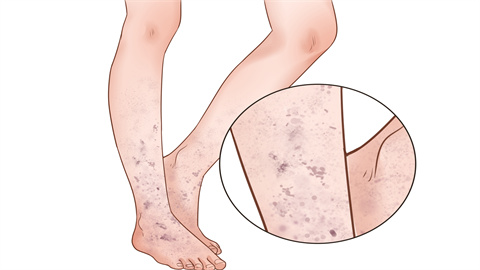What to do about senile telangiectasia
In general, senile capillary dilation may be caused by aging, long-term sun exposure, damaged skin barrier, hypertension, cirrhosis, and other factors. It is recommended to seek timely medical consultation to determine the underlying cause, followed by appropriate general treatments and medication under a physician's guidance. Detailed explanations are as follows:

1. Aging: With increasing age, collagen fibers in blood vessel walls decrease and elasticity diminishes, making blood vessels prone to dilation and deformation, commonly seen on the face and legs. In daily life, avoid cold and heat stimulation, take precautions to keep warm and protect against sun exposure when going outdoors, choose gentle skincare products, and reduce further vascular damage.
2. Long-term sun exposure: Prolonged ultraviolet radiation damages the structure of blood vessel walls in the skin, leading to vascular dilation, manifested as skin redness and visible capillaries. Apply sunscreen, wear hats, and use umbrellas to reduce direct UV exposure when outdoors.
3. Damaged skin barrier: Frequent use of irritating cleansing products or excessive exfoliation can damage the skin barrier, making blood vessels more susceptible to irritation and dilation. Discontinue the use of irritating products, use skincare products containing ceramides and hyaluronic acid to repair the barrier, and avoid frequent rubbing of the skin.
4. Hypertension: Poor long-term blood pressure control increases peripheral vascular pressure, causing capillary dilation, possibly accompanied by dizziness and headaches. Patients should follow medical advice to use antihypertensive medications such as nifedipine controlled-release tablets, valsartan capsules, and hydrochlorothiazide tablets.
5. Cirrhosis: Cirrhosis leads to increased portal vein pressure and the establishment of collateral circulation, resulting in superficial capillary dilation, commonly found on the chest and upper limbs. Patients should follow medical advice to use hepatoprotective medications such as compound glycyrrhizin tablets, silybin capsules, and polyene phosphatidylcholine capsules.
In daily life, maintain a light diet, reduce intake of high-salt and high-fat foods, and consume more fresh fruits and vegetables rich in vitamin C and vitamin E. Avoid alcohol and smoking, maintain a regular routine, and alleviate vascular stress through comprehensive care to improve capillary dilation.





